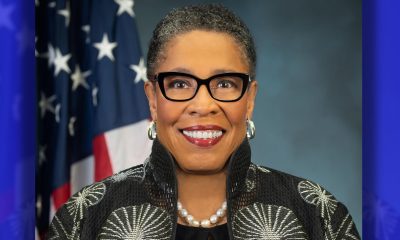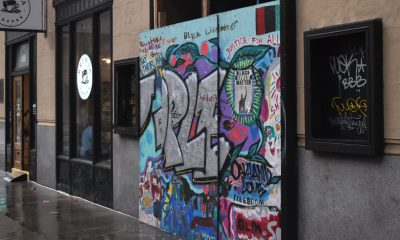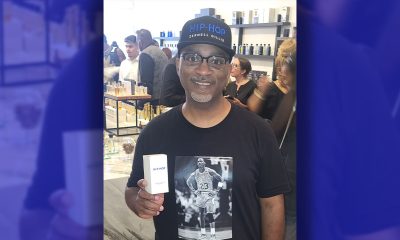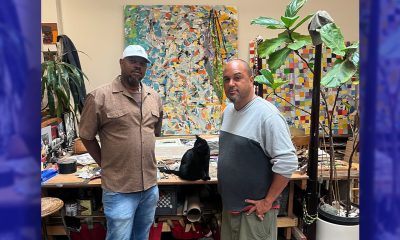Activism
Grassroots Groups Distribute About 11,000 Masks to Unhoused Residents Over Weekend
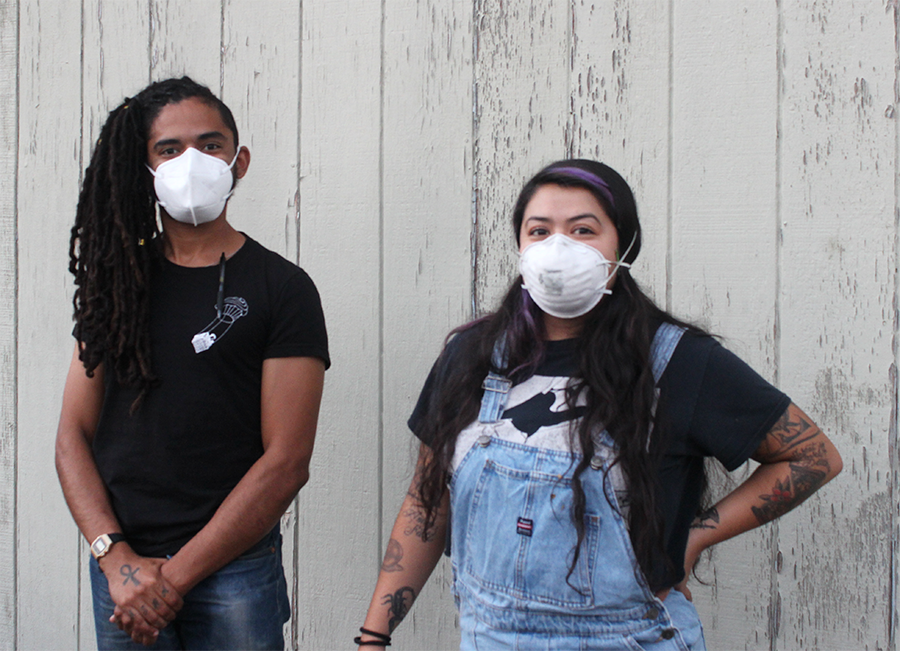
Last weekend, as smoke continued to blow into Oakland from wildfires throughout California and Oregon, Mask Oakland, a queer- and trans-led community relief project that has responded to smoke crises in the Bay Area since 2017, collaborated with seven grassroots groups to distribute more than 11,000 K95 and N95 masks, mostly to people experiencing homelessness in Oakland.
The United Front Against Displacement (UFAD), a housing justice organization, and SMC Tenants Council, a tenants union, distributed around 1,200 of those masks.
“I definitely feel a sense of urgency when I see folks and know that they’re out there for an unlimited amount of time,” said Jazmine Lopez, who works with UFAD. “It’s heartbreaking because I want to do more.”
UFAD started their work on Sept. 11 when a small group of volunteers distributed masks at 37MLK, a small unhoused community at 37th Street and Martin Luther King Jr. Boulevard where mostly elders live. Then the group distributed masks to people living under several highway underpasses along MLK Boulevard and Telegraph Avenue. They ended the day’s work by distributing masks along and just west of Wood Street and between 18th and 26th streets in West Oakland.
On Saturday, about 20 people working with UFAD distributed masks again in the Wood Street area. The Saturday distribution was part of the organization’s weekly workdays, which alternate between Saturdays and Sundays each week.
In the past, they’ve built hand-washing stations, freshwater storage facilities, a shower, and done basic cleanup work on their workdays. In total, the group handed out about 800 masks.
While face masks are widely available throughout Oakland, most are useless to protect against smoke. K95 and N95 masks, which specifically protect against smoke have been entirely sold out in Oakland stores. So, UFAD has received help from Mask Oakland.
“We support groups led by and in direct solidarity with unhoused people,” said Quinn Jasmine Redwoods of Mask Oakland. “The UFAD is great at that, and we’ve given them hundreds of masks several times this year.”
Mask Oakland also gave masks to SMC Tenants Council, who handed them out on Sunday. The tenants union gave out most of their 400 masks along the Wood street area and worked with a crew of about 20 people.
“The reason that we were out there is the same reason why we’re organizing as tenants,” said Emily Stone of SMC Tenants Council. “Our leaders aren’t doing nearly enough to solve our problems and meet our very basic needs.”
Stone said SMC Tenants Council is fighting for more protections for tenants that are not yet available, like rent cancelation during the COVID-19 pandemic and added that “our unhoused neighbors are dealing with lack of action from [our local leaders] more severely.”
Stone pointed out that resources are available to shelter people in hotel rooms through emergency powers available to California Gov. Gavin Newsom, the Alameda Councty Board of Supervisors and Oakland Mayor Libby Schaaf due to the declared state of emergency under COVID-19, but that hotel rooms still sit empty while people live on the street and are forced to inhale wildfire smoke.
While the state and Alameda County have set aside about 1,000 hotel rooms for unhoused people through Project Roomkey, their own current data shows about 25% of those rooms currently sit empty.
The City and the County have handed out masks to unhoused people, but far fewer than grassroots groups with no government funding.
Public Information Officer L. Autumn King said that the city has worked with the county and “provided over 6,500 masks within the last month.” Redwoods said Mask Oakland has handed our over 30,000 in the last month and is set to hand out about 54,000 after this upcoming weekend.
A Wood Street resident on Sunday who asked not to be named claimed all the masks he has received were from grassroots groups.
“Grassroots groups actually show up, whereas the city has not shown up,” he said.
Activism
Oakland Post: Week of April 17 – 23, 2024
The printed Weekly Edition of the Oakland Post: Week of April 17 – 23, 2024

To enlarge your view of this issue, use the slider, magnifying glass icon or full page icon in the lower right corner of the browser window. ![]()
Activism
Oakland Schools Honor Fred Korematsu Day of Civil Liberties
Every Jan. 30, OUSD commemorates the legacy of Fred Korematsu, an Oakland native, a Castlemont High School graduate, and a national symbol of resistance, resilience, and justice. His defiant stand against racial injustice and his unwavering commitment to civil rights continue to inspire the local community and the nation. Tuesday was “Fred Korematsu Day of Civil Liberties and the Constitution” in the state of California and a growing number of states across the country.

By Post Staff
Every Jan. 30, OUSD commemorates the legacy of Fred Korematsu, an Oakland native, a Castlemont High School graduate, and a national symbol of resistance, resilience, and justice.
His defiant stand against racial injustice and his unwavering commitment to civil rights continue to inspire the local community and the nation. Tuesday was “Fred Korematsu Day of Civil Liberties and the Constitution” in the state of California and a growing number of states across the country.
One OUSD school is named in his honor: Fred T. Korematsu Discovery Academy (KDA) elementary in East Oakland.
Several years ago, founding KDA Principal Charles Wilson, in a video interview with anti-hate organization “Not In Our Town,” said, “We chose the name Fred Korematsu because we really felt like the attributes that he showed in his work are things that the children need to learn … that common people can stand up and make differences in a large number of people’s lives.”
Fred Korematsu was born in Oakland on Jan. 30, 1919. His parents ran a floral nursery business, and his upbringing in Oakland shaped his worldview. His belief in the importance of standing up for your rights and the rights of others, regardless of race or background, was the foundation for his activism against racial prejudice and for the rights of Japanese Americans during World War II.
At the start of the war, Korematsu was turned away from enlisting in the National Guard and the Coast Guard because of his race. He trained as a welder, working at the docks in Oakland, but was fired after the bombing of Pearl Harbor in 1941. Fear and prejudice led to federal Executive Order 9066, which forced more than 120,000 Japanese Americans out of their homes and neighborhoods and into remote internment camps.
The 23-year-old Korematsu resisted the order. He underwent cosmetic surgery and assumed a false identity, choosing freedom over unjust imprisonment. His later arrest and conviction sparked a legal battle that would challenge the foundation of civil liberties in America.
Korematsu’s fight culminated in the Supreme Court’s initial ruling against him in 1944. He spent years in a Utah internment camp with his family, followed by time living in Salt Lake City where he was dogged by racism.
In 1976, President Gerald Ford overturned Executive Order 9066. Seven years later, the 9th Circuit Court of Appeals in San Francisco vacated Korematsu’s conviction. He said in court, “I would like to see the government admit that they were wrong and do something about it so this will never happen again to any American citizen of any race, creed, or color.”
Korematsu’s dedication and determination established him as a national icon of civil rights and social justice. He advocated for justice with Rosa Parks. In 1998, President Bill Clinton gave him the Presidential Medal of Freedom saying, “In the long history of our country’s constant search for justice, some names of ordinary citizens stand for millions of souls … To that distinguished list, today we add the name of Fred Korematsu.”
After Sept. 11, 2001, Korematsu spoke out against hatred and discrimination, saying what happened to Japanese Americans should not happen to people of Middle Eastern descent.
Korematsu’s roots in Oakland and his education in OUSD are a source of great pride for the city, according to the school district. His most famous quote, which is on the Korematsu elementary school mural, is as relevant now as ever, “If you have the feeling that something is wrong, don’t be afraid to speak up.”
Activism
WOMEN IMPACTING THE CHURCH AND COMMUNITY
Juanita Matthews, better known as “Sister Teacher,” is a walking Bible scholar. She moved to California from the great state of Arkansas in 1971. Sister Teacher has a passion for teaching. She has been a member of Bible Fellowship Missionary Baptist Church since 1971.

Sister Juanita Matthews
55 Years with Oakland Public School District
The Teacher, Mother, Community Outreach Champion, And Child of God
Juanita Matthews, better known as “Sister Teacher,” is a walking Bible scholar. She moved to California from the great state of Arkansas in 1971. Sister Teacher has a passion for teaching. She has been a member of Bible Fellowship Missionary Baptist Church since 1971. She followed her passion for teaching, and in 1977 became the lead teacher for Adult Class #6. Her motto still today is “Once My Student, Always My Student”.
Beyond her remarkable love for the Lord, Sister Teacher has showcased her love for teaching by working for the Oakland Unified School District for 55 years, all but four of those years spent at Emerson Elementary and Child Development School. She truly cares about her students, making sure they have the tools/supplies needed to learn either at OUSD or Bible Fellowship Missionary Baptist Church.
She’s also had a “Clothes Closet Ministry” for 51 years, making sure her students have sufficient clothing for school. The Clothes Closet Ministry extends past her students, she has been clothing the community for over 50 years as well. She loves the Lord and is a servant on a mission. She is a loving mother to two beautiful children, Sandra and Andre. This is the impact this woman of God has on her church and the community.
-

 Activism4 weeks ago
Activism4 weeks agoOakland Post: Week of March 27 – April 2, 2024
-

 #NNPA BlackPress4 weeks ago
#NNPA BlackPress4 weeks agoCOMMENTARY: D.C. Crime Bill Fails to Address Root Causes of Violence and Incarceration
-

 #NNPA BlackPress4 weeks ago
#NNPA BlackPress4 weeks agoFrom Raids to Revelations: The Dark Turn in Sean ‘Diddy’ Combs’ Saga
-

 #NNPA BlackPress4 weeks ago
#NNPA BlackPress4 weeks agoCOMMENTARY: Lady Day and The Lights!
-

 #NNPA BlackPress4 weeks ago
#NNPA BlackPress4 weeks agoMayor, City Council President React to May 31 Closing of Birmingham-Southern College
-

 #NNPA BlackPress4 weeks ago
#NNPA BlackPress4 weeks agoBaltimore Key Bridge Catastrophe: A City’s Heartbreak and a Nation’s Alarm
-

 #NNPA BlackPress4 weeks ago
#NNPA BlackPress4 weeks agoBaltimore’s Key Bridge Struck by Ship, Collapses into Water
-

 #NNPA BlackPress4 weeks ago
#NNPA BlackPress4 weeks agoBeloved Actor and Activist Louis Cameron Gossett Jr. Dies at 87




